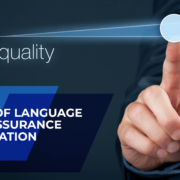What is the role of language Quality Assurance in localization?
LQA (Language Quality Assurance), is the final, but important step in any successful localization project, whether it is a game, instruction manual, website, etc. Customers are entitled to and expect high-quality results for their projects.
Mistakes in the final translation will undermine the customer’s trust in the LSP’s professionalism and the project’s integrity. As a result, service providers must ensure the project is unquestionably free of any errors.
At Janus, we ensure that the proofreader and language editor working on a project’s editing and quality assurance are not the same people who translated it. This prevents attempts in self-editing and self-review, a practice that does not ensure a customer receives high-quality content.
Linguists perform two distinct tasks: translation and editing. An editor is tasked with checking and reviewing the original content received from the translator for accuracy and completeness during this process. Following that is the quality assurance process, which is the final quality step.

We’ve set up an efficient Language Quality Assurance process that checks translated content for linguistic accuracy and technical adequacy to industry standards. This procedure ensures that the customer receives a successful and error-free translation in all multimedia projects, software localization, websites, and documents.
An expert editor ensures that the final copy is technically correct, has correct verb tenses, proper collocations/word usage, correct grammatical structure, and grammatical and stylistic consistency, and that there are no contextual errors.
The translation is also reviewed for correct use of linguistic structuring, such as terminology, cultural accuracy, idioms, and local terms, during the linguistic quality assurance stage. This step ensures that the final work is a perfect expression for the markets for which it is intended, and that it sounds as natural to the target audience as the initial content does to the original audience. LQA also ensures that the final product does not appear to be a literal, awkward, or forced translation.
Finally, the LQA phase examines the translated file for accuracy against industry standards, as well as whether it contains standard industry vernacular or corresponding terminology for any specific subject. For example, different industries, such as gaming, technology, and food, have specific terminologies that must be included in the final content to make it more appealing to the target audience.

At the same time, there is also a long-term perspective in LQA. It is about evaluating and monitoring our resources’ performance, providing measurable output, straightening out dips in standards, and maintaining sustainable quality.
In conclusion, we’d like to reiterate that LQA is not an option, it is a necessity that prevents any negative feedback from customers and ensures consistent optimum results.





